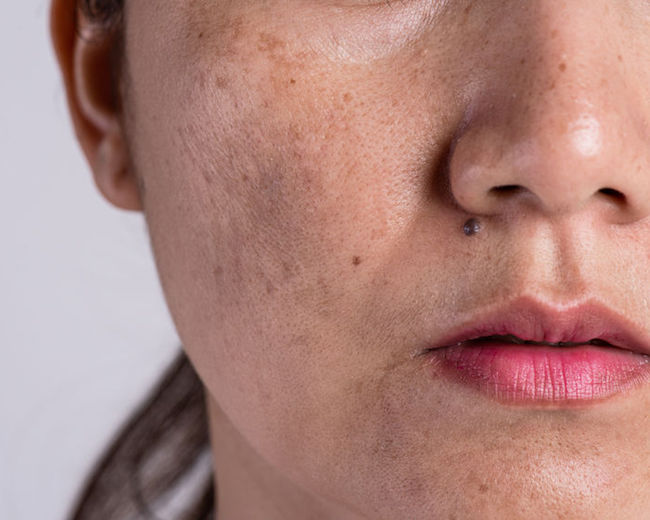How to avoid dark spots - and what to do if you already have them
A light dusting of freckles may be all the rage, but dark spots still remain a valid concern for many people. Let’s get the lowdown on pigmentation.
It can be quite the hassle when you find your previously well-behaved skin suddenly turning rogue, so we thought we'd get some professional insight into what causes pigmentation, how you can treat it and what you can do to prevent it. Jeanine Giot, owner and skincare therapist at Jentl Health & Skin Care in Cape Town, provided some expert insight on the matter.
What is pigmentation and what causes it?
First off – a little biology lesson. Pigmentation is associated with the behaviour of melanocytes - mature melanin-forming skin cells that produce and distribute melanin, a pigment that naturally protects the skin against UV radiation that damages our DNA and can potentially cause skin cancer. Dark spots are the result of overexcited melanocytes. So, what happens to get them all excited?
“There are various factors that play a role,” explains Jeanine. “This includes hormones, genetics, illness, injury, medication and inflammation.” Here’s a bit of a breakdown:
Hormones
People with a hormone imbalance are more prone to pigmentation. This includes individuals with hormonal disorders like polycystic ovarian syndrome; women on oral contraceptives like the pill or injection; as well as pregnant women.
Genetics
Being prone to pigmentation can also be genetic, as is the case with people who have freckles. These skins have a natural inclination to overproduce brown cells.
Illness
Many people don’t realise that their skin becomes more sensitive when they’re ill. Our cells work in synergy, so when your immune system is impaired by anything from the common cold to more serious conditions and diseases, every cell in your body is affected- including your melanocytes that are getting weaker protection from your melanin. At times like these, pigmentation becomes more likely.
Injury
Any kind of injury and trauma to the skin can also cause dark spots.
Medication
When you’re taking certain medications, such as cortisone or antibiotics, you’re at greater risk for pigmentation.
Inflammation
A lot of treatments that are being performed in salons can actually cause inflammation. You get something we call post-inflammatory pigmentation disorder – for example, you go for a chemical peel or a microdermabrasion, go out into the sun and develop pigmentation. This is why it’s so important that therapists are properly trained, so they can advise their clients on proper aftercare.
How can you treat pigmentation?
The best way to treat existing pigmentation is to go to a reputable skincare therapist who can help you to balance your skin's condition and then go on to treat the pigmentation itself. Why this topsy-turvy approach, you may ask - surely the pigmentation is the more pressing concern? Not so, according to Jeanine.
“Your skin type (oily, dry, combination) is something you're born with. Those things need to be treated first because you can get pigmentation if your skin type isn't balanced. If you are overproducing oil, severely dehydrated, or your skin suddenly becomes very sensitive, you can become more susceptible to pigmentation.”
This is why Jeanine and her team always address a client’s healthy skin care barrier first if they arrive at the salon with pigmentation. “If we treat for pigmentation while the skin type is still in disarray, you will not get an effective treatment,” says Jeanine. “This is why we work to balance the skin over the course of a month or two, and once everything is in check, we start introducing products and treatments that focus on the pigmentation itself. This normally includes natural fruits acids, derma pen sessions, skin blading or laser.”
What can you do to avoid pigmentation altogether?
"Be careful when you go out into the sun," says Giot. "While we all require some daily sun exposure to support sufficient vitamin D production, regulating the time you spend in direct sunlight will minimise your risk of pigmentation. Every person's skin is different and depending on your skin type you may be able to handle more sun than the next person, so you have to determine what's enough for you.”
“I'll tell you what I do, however - I follow a good skincare regime and wear an SPF of 30 or higher every day. To this I add polarised sunglasses and a wide-brimmed hat. I also stay out of the sun from 11h00 and 15h00 and keep hydrated so my skin is more resilient. A side benefit of this regime is that my skin isn't ageing as fast as it would have if I'd let my sun exposure go unchecked (a win-win in anyone's book!)."
IMAGE CREDIT: 123rf.com
Products featured in this article
-
Even Pigment Perfector Dual Serum 30ml
R 650.00 -
Even Better SPF20 Skin Tone Correcting Moisturizer 50ml
R 890.00 -
Sun SPF50 Shine Control Cream 50ml
R 205.00 -
Nivea
Perfect & Radiant SPF15 Facial Day Cream 50ml
R119.00 -
Nivea
Perfect & Radiant Facial Night Cream 50ml
R119.00 -
Nivea
Perfect & Radiant SPF30 Day Cream
R127.40



